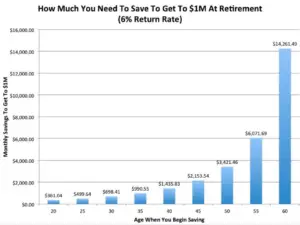This post may contain affiliate links, which means if you click through and purchase something using my links, I receive a small commission. You can click here to read my disclosure policy ? Thank you!
Welcome to the sixth installment of Sunburnt Saver’s Budgeting 101 series. During April, we’ll be talking budgets: why we should budget, how to prioritize your budgets, and how to plan for the expected (and unexpected!). If you like this series, please share your thoughts in the comment and let me know what questions you’d like answered (you can even comment if you don’t like this series!)
Today we’ll be discussing if it’s more important to repay debt you’ve accumulated or save for retirement. If you’ve ever wondered what to do with your leftover income at the end of the month (aggressively pay down debt or prepare for the future), this will be a good start to setting your priorities based on your situation.
One question that plagues Millennials and Gen-Xers alike is whether to pay off debts or save for retirement. We’ve all heard the dire news: Social Security, if it’s still around, may be dramatically different from how it is now. Even if you get money in your older age from Social Security, it likely won’t be enough to live on (unless you want a drastically reduced quality of life). Add that to the fact that almost no one receives pensions anymore (and yes, government employees, your pension quality is decreasing too), plus the dramatic increases in healthcare costs, and we have a scary future ahead of us.
On the other hand, having debt keeps us tied to paying monthly amounts, usually in the hundreds of dollars, that we likely can’t discharge – even in bankruptcy. It reduces our ability to save, charges us high interest rates, and is at the very least an annoying nuisance.
Is it any wonder that the advice between paying off debt and saving for retirement is contradictory? If you have the choice between being tied to a $400 a month debt payment that strangles your ability to have a better life, or having to eat cat food in your older days, which would you choose? For many, it’s repaying debt.
Obviously, we have to repay our debts. Whether or not those interest rates are fair is an argument for another post, but it’s a fact of many people’s lives. However, we can’t bury our hands in the sand and not save for retirement either. Here are a few ways to manage debt repayment while saving for retirement, all while sticking to your budget.
Save for Retirement First
The single best recommendation I can make is to take advantage of compounding interest by saving and investing your money for retirement. If you start saving for retirement at age 25, you’re in a much better financial position by the time you’re 65 versus someone who starts saving at 40. While I’m not a financial planner, the math certainly adds up – especially if you invest your money and take advantage of the stock market.
But wait, you might say, the stock market is a gamble. As we saw in the mid-2000s, many people nearing retirement age lost a quarter or more of their money when the stock market fell. While this is true, we have to look at investing in the stock market overall. Over the long term, investing in the stock market can generate returns from 5-7% – and that’s a conservative estimate. You certainly won’t see gains like that from your savings account, or even a money market account, which makes investing in the market a good bet.
I’m not advocating investing in stocks without thought – the best way to achieve moderate, consistent gains is investing in an index fund that tracks the S&P 500, for example. You can check out Vanguard’s fund here (no affiliate), or talk with your financial professional for more guidance. You can also check out books to educate yourself more about investing, but beware of people claiming to be “financial gurus” who achieve rates of return of 10% and more. Stick with your gut when investing, and keep your assets diversified (i.e. don’t invest in just one stock, for example).
Don’t believe me? Just watch (as Bruno Mars says). Check out this graph below from Business Insider. As you can see, just by starting out early, you can save less money yet still have $1 million at retirement. That’s just from compounding interest – it doesn’t include the amount you would have at retirement if you invested.
Even if you have to balance your retirement savings with debt and life expenses, consider setting aside even a small portion of your leftover money for retirement. It will pay off in the long-term, especially if you are able to supplement your savings with Social Security.
Repaying Debt
While I still strongly recommend saving something for retirement, you’ll also need to consider the debt you currently have. If you have high interest credit card debt, do (almost) everything you can to pay it off. Credit card debt is an anchor around your neck, and not paying off your credit card bills monthly can really come back to hurt you.
Think about it this way: if you bought a $500 TV on a credit card with an interest rate of 18%, and you don’t pay off the bill right away, you add $90 to next month’s bill, for a total of $590. Pay down $100? Great! But now, because of interest, you owe $578 – not $490, like you may have thought. Let that 18% interest rate accumulate for a year or so, and suddenly your $500 TV is now an $1,000 albatross.
If you’re unable to pay off your credit cards immediately, it’s time to prioritize your debt – yes, even before your other priorities. Pay it off as quickly as you can, particularly if you have less than $5,000 in credit card debt. Some ideas for earning additional money to pay down debt:
- Tax refunds
- Monetary gifts from family
- Garage sales
- Side hustle income
If you have more than $5,000 in debt, still tackle it aggressively. However, it will take you longer to pay $5,000+, so incorporate your repayment with some savings. As we discussed on Tuesday, definitely make sure you have at least $1,000 in your emergency fund. From there, split your savings between repaying debt and saving for retirement.
Auto loans, your home mortgage, and student loan debt are a little different from credit card debt. First, your interest rate is probably lower, and it may not always be in your best interest to tackle that debt as aggressively. I’m not an expert on paying off a mortgage, but Lifehacker has a great write up with the pros and cons of paying off your mortgage early that you can read here. There are many different types of mortgages that you need to consider. Your first ever mortgage will be completely different to a mortgage that you get when you are older. It might be a good idea to check out someone who can guide you when it comes to your finances during retirement.
In the case of student loan debt, it may be more beneficial for you to apply for Income-Based Repayment or Pay As You Earn to reduce your monthly payments. If you work in public service (as a teacher, in government, in certain non-profits), you could have your loans forgiven in 5-10 years. Depending on how much you owe (say, more than $50,000), it may work out that having your loan forgiven in 10 years is still sooner than you would pay it off yourself, even if you aggressively tackled it.
The best way to choose between saving or repaying debt is to sit down with your budget and see how much “extra” cash you have at the end of the month. If you’ve been using our budget tracker, take a look at previous months and see what’s leftover. If you have $100, consider splitting it in two and put some toward your emergency savings (or retirement) and some toward debt. You may pay off your debt slower, but you’ll also be taking advantage of your youth and compounding interest!


Great advice!! I agree that the best way is to look at your individual finances and see what makes the most sense for you. If you have a high-interest credit card, I would say it’s probably best to work on paying that down with any extra income you have. The faster you can get rid of debt, the better!!
Thank you, Sarah! High interest debt is definitely the first thing to pay off first. It’s hard to put off savings to pay off high interest debt, but it really will pay off in the long run!